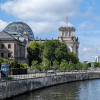
Isabel Sutton is a journalist and documentary maker based in London. Her background is in making radio and television documentary programmes mainly for the BBC. She has spent the last six months as an International Journalism Fellow with Clean Energy Wire.
What it's like to work with the CLEW newsroom
Clean Energy Wire is an unusual media organisation. If, like me, you're used to thinking of newsrooms as closed environments where stories and ideas are fiercely guarded and outsiders are a little unwelcome, then CLEW comes as a surprise. The atmosphere at CLEW is about sharing and exchange. Working with their team, you feel part of a climate journalism community which starts in Berlin but extends around the world.
I have spent the last six months working with CLEW as an International Journalism Fellow and from the beginning I felt included in every part of the organisation. Due to the pandemic, I have been working from London (where I live) while CLEW staff are working from their homes in Berlin. I have not been the only person to join the organisation from outside – along with me, there is Laís from Brazil, working with CLEW while studying in Leipzig; Orwa, studying in Berlin; and Barbara, another International Journalism Fellow, based in Warsaw. Each week, we connect online for group meetings, one-to-one discussions, public events, and occasional social meet ups. All group meetings begin with a catch-up where everyone shares what they have been doing, both in and outside work. It’s a friendly, open and non-hierarchical atmosphere.
The CLEW newsroom comprises five specialist correspondents who cover climate and energy politics. Kerstine writes about agriculture and the energy grid; Julian’s focus is European politics and energy diplomacy; Sören is a specialist on the auto industry; Benjamin reports on renewables and sustainable finance; and Charlotte has an eye on the climate movement. However, the correspondents don’t just focus on their own stories; they offer their knowledge to anyone who is seeking information about the energy transition in Europe.
As someone without a background in climate and energy reporting, I have been on an intensive learning journey while at CLEW. Thanks to the openness of the news team and the opportunity to attend all meetings and events, I have been able to pick up knowledge quickly on topics I am interested in. Working with CLEW is creative and satisfying; you can really get involved and there are no limits imposed on what you can do. One former International Journalism Fellow whose expertise was as a political cartoonist is still working on cartoons for the website years after his placement ended.
My focus while at CLEW has been research and writing. I have had the opportunity to write on a number of fascinating subjects including citizen energy in Germany, the climate movement across Europe, and the gender-based impacts of climate change. The news team have given me advice, support and feedback, as well as carefully editing my articles for publication. I have had practice at pitching ideas and defining the story I am trying to tell. I have received really useful tips on how to present a story in a nutshell for an editor to read. Writing about topics such as renewable energy production in Germany has taught me some useful lessons in interpreting statistics and communicating numerical information in a way that is clear and meaningful. I have also been given valuable pointers for structuring articles and ensuring I have examined a topic from all angles and included a spectrum of opinions. Above all, I have been given the chance to practice on the job, trusted to work independently but with expert advice, encouraged to come up with ideas and supported to initiate new projects. I have loved the opportunity to spend time on research and writing and I have developed a deeper interest in and commitment to various topics, in particular the politics and social justice dimensions of the energy transition.
CLEW is at the centre of a wide international network and being an IJP fellow gives you a feeling of being part of a movement dedicated to climate communication. Milou is the network manager of CLEW’s community of over 250 journalists. Pre-pandemic, the organisation offered opportunities for journalists to come together in person for research tours and events. During the pandemic, events have continued online organised by Eva, CLEW’s programme officer. During my placement, Milou and Sven, CLEW’s editor-in-chief, have introduced me to various members of the journalism network who’ve been able to help me with information for stories. The network offers exciting opportunities for collaboration and learning. For those interested in the techniques and strategies of climate communication, CLEW’s sister organisation Klimafakten also provides a great opportunity. The team at Klimafakten works primarily in Germany, developing resources for teaching the most impactful and effective ways to communicate about climate change.
Up until now I have worked for ten years in broadcast journalism and documentary making and, working with CLEW, I have really appreciated the opportunity to do more writing. During my time as an IJP fellow, I have published a story in The Guardian here in the UK, inspired and informed by the work of the news team. I hope very much to continue writing and to keep my focus on climate change which is more and more fascinating and concerning to me. I have been given confidence and motivation to continue with climate journalism as well as contact with many others working in the same field. Once my fellowship ends, I will definitely become a member of the CLEW network and stay in touch with the team in Berlin. They have not only been fantastic colleagues but also sources of support and kindness through the lockdowns this year.
